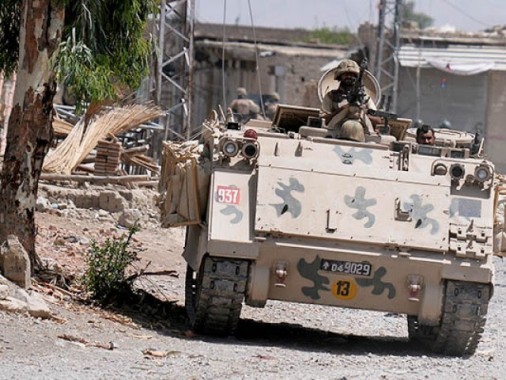
The military official was of the view that security forces could not risk “slowing down or temporarily suspending” Operation Zarb-e-Azb. PHOTO: AFP
“Conducting operation in winters is certainly a challenge for the security forces but it is also a challenge for militants,” the official told The Express Tribune. He asked to remain anonymous because of the sensitivity of the issue.

Speaking about the winter strategy, he made it clear that the military would continue to ‘strangulate terrorists’ irrespective of weather conditions. “We will not let terrorists off the hook,” he insisted. His assessment came amid concerns that actions against terrorists could be slowed down due to the impending unfriendly winter in the rugged terrain of North Waziristan.
The military official was of the view that security forces could not risk “slowing down or temporarily suspending” Operation Zarb-e-Azb. “Terrorists have been already on the run and we will not give them any chance to regroup,” he added.
Operation Zarb-e-Azb, the codename for the full-scale offensive in North Waziristan, began on June 15 after months of painstaking efforts by the government to strike a peace deal with the Tehreek-e-Taliban Pakistan (TTP) and its affiliates failed.
So far the military claims to have killed over 1,100 terrorists in the operation, which is seen as the beginning of the end of militancy that has killed and maimed thousands of lives – mostly innocent civilians – over the past 10 years or so.
The military also claims to have cleared major towns of North Waziristan, including Miramshah, Mirali, Boya, Degan, and area up to Dattakhel. Clearance of pockets of resistance between Miramshah-Mirali in villages Momin Gul Ziarat, Darpakhel, Tappi, Spalga and south of the Tochi River is under way.
Operation ‘Zarb-e-Azb’ has left over 1 million tribesmen homeless and compelled them to find refuge in makeshift camps in Bannu district and elsewhere in Khyber-Pakhtunkhwa.
When asked about the possibility of allowing Internally Displaced Persons (IDPs) to return to their homes in the areas cleared by security forces, the official said a strategy was being evolved in this regard. “One option is to allow the IDPs to return once the entire agency is cleared of terrorists. But it depends on how the situation evolves on the ground,” the official added.
Regarding a possible timeframe, the official said it was not possible to give a definite deadline for the completion of the operation due to ‘strategic reasons.’ Given the ground situation, it appears the operation will continue in foreseeable future.
In order to preclude possible blowback of the Waziristan operation in major towns, as many as 2,274 intelligence-led counter-intelligence operations were carried out across the country. At least 41 terrorists were killed in these operations which also led to the arrest of 134 suspected terrorists.






